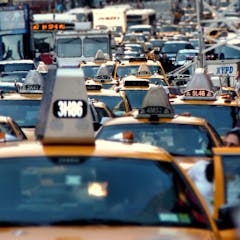
University of Maryland, Baltimore County

UMBC is a leading public research university known for innovative teaching, relevant research across disciplines, and a supportive community that empowers and inspires inquisitive minds. UMBC serves 14,000 undergraduate and graduate students, and combines the learning opportunities of a liberal arts college with the creative intensity of a leading research university. At the same time, UMBC is one of the country’s most inclusive education communities. UMBC also contributes to Maryland through strong government and industry partnerships that advance K–16 education, entrepreneurship, workforce training, and technology commercialization.
Find us on:
Snapchat: @UMBClife
Links
Displaying 221 - 240 of 299 articles

Highly engineered composite materials let skis ride smoothly, carve neatly and turn quickly – for top athletes and regular consumers alike.

New York soon may charge a fee to drive into central Manhattan as a way of reducing traffic and raising funds for public transit. An urban scholar says this step is overdue in the United States.

Amazon, like the entire tech sector, has suffered from a lack of diversity in its workforce. This trend is likely to continue when it opens a second headquarters in one of 20 cities.

Storing data in the cloud is convenient, but how secure is it? And what are users’ options for stepping up their data security?

A future that continues to have increasingly fast computing depends on quantum physics – but research is showing that there are limits to how fast quantum computers can go.

The death toll from HIV/AIDS continues to decline, but more than 36 million people are still living with HIV. A researcher explains why the work for a cure is painstaking.

A scholar explains why the president’s plan to overturn his predecessor’s rule would be a big mistake and disproportionately harm women.

Precisely calibrated timekeepers are found in organisms from all domains of life. Biologists are studying how they influence plant/pathogen interactions – what they learn could lead to human medicines.

As the issue of an open and free internet again comes up for public debate, Congress could participate – and help regulators devise a workable set of policies.

The modern world depends on critical systems, networks and data repositories that are not as secure as they should be. Breaches will continue until society as a whole makes some big changes.

The benefits of hosting the Olympics are so slim, or nonexistent, that fewer cities are bidding to host the games. That’s a sign of serious trouble.

Oysters grow in seawater and filter their food from it, so how do you shield them from waterborne diseases? Scientists are working to develop strains that are resistant to a fast-spreading herpes virus.

Robots have the potential to help support a growing population that wants to age in their own homes. But those helpful machines won’t be the humanoid butlers of science fiction.

We’re used to thinking of our eyes detecting light as the foundation of our visual system. But what’s going on in other cells throughout the body that can detect light, too?

As the animated film ‘Bambi’ celebrates its 75th anniversary, a reminder that humans often try to express reality. But once they do, they go back to making art.

Trump’s rationale for cutting the Temporary Assistance to Needy Families program rests on a myth at odds with contemporary data.

The health care bill proposed by Senate Republicans was little better than the House version, which begs an important question: Who’s driving health care law – a free market or insurance companies?

In an urbanizing world, people increasingly are seeking out nature in cities. Research shows that diverse species of animals, plants and insects can thrive in areas that humans have altered.

Nobody can understand the legal language in privacy policies. Can artificial intelligence digest the text and produce a human-readable explanation?

Math instruction is stuck in the last century. How can we change teaching methods to move past rote memorization and help students develop a more meaningful understanding – and be better at math?
